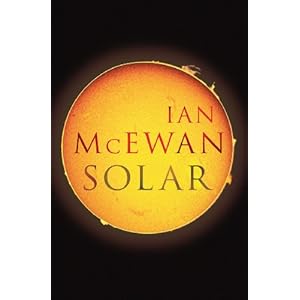
It's not every day that one's favourite author releases a new novel so, needless to say, I was psyched to read Ian McEwan's Solar. Once again, McEwan shows why he's one of the best writers in Britain if not in the whole world: his work is sharp-edged, argumentative (but not polemic), startling, hilarious and profane.
Solar's protagonist, Michael Beard, is a repellent, fat and aging physicist who lives off the fame of his Nobel Prize from the 1970s. Egotistical at best and adulterous, bigoted and alcoholic at worst, Beard has been through five wives and continues to covet everything in sight: women, food, gossip and credit for the work of others.
From an expedition to the Arctic Circle to the blazing heat of New Mexico to an incident over salt and vinegar crisps on a London train, Solar presents a brilliant juxtaposition of the "right" thing to do against the selfish but naturally "human" reaction. Though I can admit that McEwan's style isn't for everyone, I certainly never tire of it.



